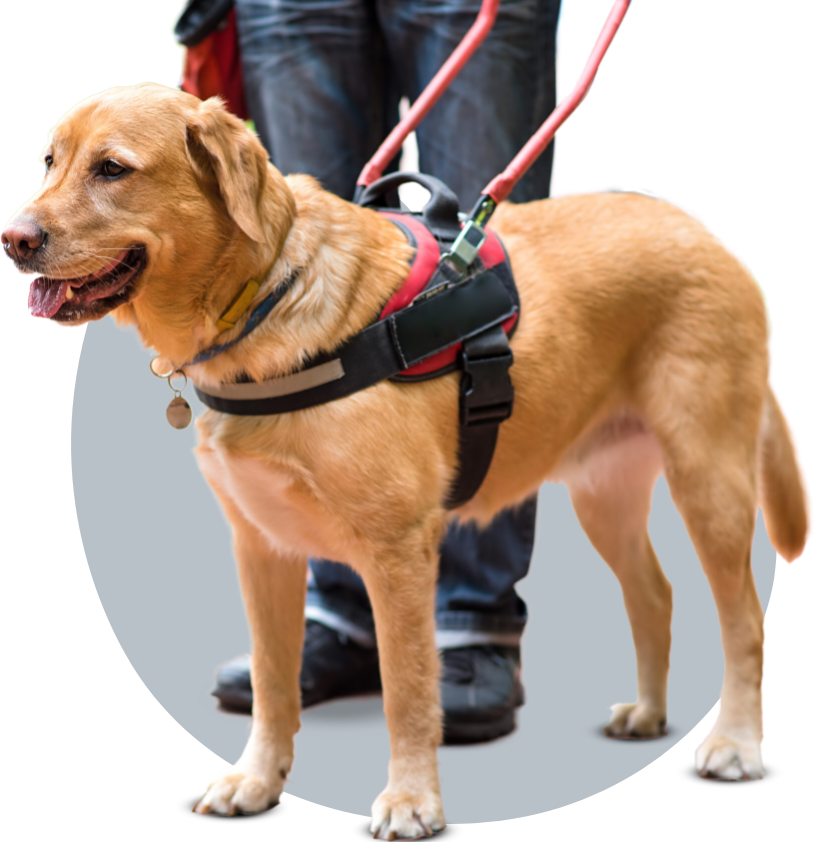How Service Dogs Help People with PTSD

According to the American Disabilities Act, or ADA, service animals are those that have been trained to perform certain tasks for a disabled person. These tasks may include physical activity or emotional support. Service dogs are commonly used to help those that are suffering from post-traumatic stress disorder, commonly referred to as PTSD. These service dogs have been specifically trained to assist someone that has experienced some form of significant trauma.
What PTSD Service Dogs are Trained to Do
It’s important to understand first that service dogs are not pets. For this line of work, most dogs are trained from their early years by specialists to become service dogs. These dogs then receive further training to match their companions’ disabilities. These disabilities can be physical like visual or hearing impairment, loss of a limb, etc., or invisible illnesses like diabetes, anxiety, PTSD, depression, etc. PTSD service dogs receive specialized training to sense the symptoms and assist during times of crisis. The following list of tasks defines the job responsibilities of a PTSD service dog best:
- Anticipates an anxiety or panic attack and gets their handler away from the trigger
- If the attack sets in, the service dog can disrupt the cycle and bring water and medication
- Recognizes hormone changes through sweat and changes in blood pressure and heart rate and initiates physical touch to calm the handler
- Assists in the time of depression
- Protects handler from getting overcrowded by creating a barrier
- Interrupts nightmares by waking the handler and switching on lights
- PTSD service dogs are also trained for positional commands. For example, PTSD service dogs for veterans can stand behind the veteran in public to create a sense of safety.
Not all service dogs receive the same training. The training depends on the companion they need to be matched with. PTSD service dog training is quite extensive and the training fortifies the behaviors enough so that the dog can perform the tasks under the maximum amount of distraction. Apart from its tasks, the non-judgmental companionship and support that service dogs provide have emotional and therapeutic value. This is why service dogs work so well as a complementary intervention to mainstream therapies and medication.
How a Service Dog Helps Alleviate PTSD Symptoms
Provide Security
There are a variety of incidents that could cause someone to suffer from PTSD. If a patient has been a victim of an assault, this could cause them to fear leaving their home. A service dog can serve as both a companion and as security for that person. The existence of a dog may make them feel protected, should they fear that someone might enter their home or approach them. As a victim of assault, they may also fear leaving their home by themselves. A service dog can serve as a companion so that they will never be alone, potentially causing them less stress or fear that something might happen.
Self-Sufficiency
Those suffering from PTSD may find it more difficult to live independently and completing certain tasks, such as taking medication or sleeping through the night. Those that use a service dog tend to take their medication more regularly. Additionally, they sleep better through the night with the assistance of a companion so they function better the next day. The assistance of a service animal with these daily tasks will allow those suffering from PTSD to function better independently.
Greater Coping Skills
The assistance of a service dog can help someone suffering from PTSD cope better with their situation and receive help from others. Dogs that have been trained to help with PTSD have certain behavioral traits that will be observed by the person. The presence of the dog will also force the person suffering from the condition to focus on the animal, as they will be playful and loving. This focus on something other than what has caused their condition will help them become less anxious and more self-sufficient.
Modulate Stress Level and Tone of Voice
PTSD can cause increased stress levels and a change in the tone of voice, potentially making communicating with others a difficult process. When working with a service dog in the comfort of their own home, they will need to reduce stress and use a certain tone of voice in order for the dog to react to their commands. This will allow them to practice adjusting these attributes so that they will know how to control them when associating with other people.
A Loving Companion
A major impact of PTSD is that the person suffering from the condition may be unhappy due to the feeling of isolation, stress, and uneasiness around others. In addition to providing a feeling of security and confidence, a service dog is a loving companion. This will allow the person suffering from PTSD to feel less isolated and happier in their daily life.
Post-traumatic stress disorder can be caused by a variety of factors and be very difficult to overcome. The assistance of a service animal with psychiatric service dog registration will allow that person to be more independent and happier in their daily life. Contact the National Service Animal Registry if you’re looking for a service animal to help with PTSD.
Flashbacks
Post Traumatic Stress Disorder is becoming increasingly common among adolescents, adults, war veterans, and even children. Loss of a loved one, living alone, family problems, war, and other traumatic events change people’s lives dramatically. Before you know it, you start getting panic attacks, mood swings, flashbacks to the distressing event, and find yourself unable to adjust to social settings. And then it all becomes so overwhelming that it is no longer possible for you to return to life as you knew it.
Sometimes the flashbacks get so intense that you find yourself spiraling down deeper into it with no way of getting out. This is where PTSD service dogs can help. A psychiatric service dog is adept at understanding that you are having a flashback episode through your bodily changes like increased heart rate and blood pressure, hormonal imbalances, changes in your facial expression, etc. They can immediately jump in to break the cycle. If the flashback happens during sleep, your PTSD service dog will wake you up, switch on the lights, open doors, and bring help in extreme situations. This support helps the sufferer to regain control and manage emotions to get out of the episode.
Flashbacks are common among war veterans and usually involve visual and auditory memories of combat. This is also known as “Dual awareness” where the sufferer is unable to distinguish between the hallucination and reality. PTSD service dogs for veterans can recognize the symptoms and help bring the sufferer back to reality. These dogs act as a comforting presence for war veterans and also as a sleeping aid.
Connecting With Your Friends and Family
PTSD is isolating. You feel uncomfortable in a social setting. You no longer want to participate in family gatherings, go out with your friends, take your spouse out to dinner, make new friends, and so on. As you begin to overcome the problems of PTSD with the help of a service dog, you will feel safe to do all of these activities and reconnect with your friends and family.
A study has found that pet owners are highly likely to meet new people. A quarter of the participants in the study mentioned that they made at least one new friend rather than acquaintances. In fact, dog owners are five times more likely to meet new people than other pet owners. Dog walking is one of the best ways to make these new acquaintances. So when you have a PTSD service dog with you, you will feel more confident outdoors and build new networks.
Preventing Overcrowding
Sometimes a panic attack can be triggered when people encroach upon your personal space in public. Not everybody understands the concept of personal space. Sometimes you may not even see the person coming up behind you and into your comfort bubble. A PTSD dog will alert you of any such triggers so that you can take the necessary precautions.
At the time of panic attacks, your service dog can create a barrier around you and protect you from getting overcrowded. If someone is coming up close behind you, your service dog can reposition itself and nose your hand to let you know that someone is behind you. This will alert you to potential threats.
Register Your PTSD Service Dog
National Service Animal Registry provides psychiatric service dog registration services. With our services, certifying your PTSD service dog is easy. Our legitimate service dog registration services have been used over 215K times since 1995. Registering your PTSD service dog with us provides benefits like inclusion in the online service dog database, lifetime registration, frameable embossed certificate, ID card, leash clip, service dog vest, leash, collar, etc.
While it is not necessary for your dog to wear a service vest, it is still helpful since many dogs associate the vest with being on duty. Apart from these, you can also apply for a PTSD letter from a licensed medical health practitioner. This will be the documentation you need when anyone questions you about your accompanying PTSD service dog.
Get your PTSD Service Dog Letter today!














































































